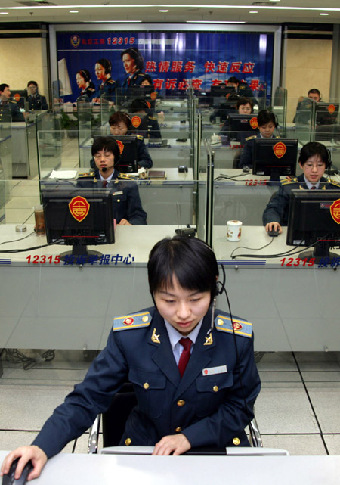V-6 Question: To maintain fair competition, China is enacting and deliberating the Anti-Monopoly Law? Why does China make this law? What does this law cover?
A: Anti-Monopoly Law is often nicknamed the "Economic Constitution." Currently, more than 80 countries have passed anti-monopoly laws. In some countries, anti-monopoly law has existed for over a century. On June 24, 2004, the Chinese Government submitted the draft Anti-Monopoly Law to the National People's Congress (China's top legislature) for deliberation.
Although China has passed the Anti-Unfair Competition Law, the Price Law and regulations on telecommunications industry, in absence of an anti-monopoly law, monopolies have emerged in some regions or sectors, hampering economic growth and international competition. In particular, some government agencies or public administrative organizations have intervened in the market, thwarting competition. As a market economy, China needs to strengthen the anti-monopoly law to prevent and prohibit monopoly behaviors of domestic or international firms, give market players fair, transparent and predictable rules to abide by, maintain market order, and promote healthy, sustainable and balanced economic growth.
The draft Anti-Monopoly Law submitted to the National People's Congress for the first debate includes eight chapters, with a total of 56 articles. The draft law prohibits monopoly agreements and the abuse of market power and restricts market concentration. The draft law also provides for punishments for elimination or restriction of competition by administrative powers, and contains articles on anti-trust as well as legal liability.
In China, the most common form of monopoly behavior is monopoly agreements. Monopoly agreements directly undermine fair competition. The draft law prohibits monopoly agreements, with exemptions granted to agreements that will promote technological progress, economic development and public welfare.
The draft law does not outlaw the gaining of market power through competition, yet the law prohibits the using of market power to suppress competition. Such behaviors include price monopoly, refusal to deal, coercive transaction, products bundling, and discriminatory trading conditions. Such a law will promote fair competition without restricting the growth of big firms.
Restrictions on market concentration are listed in the Anti-Monopoly Law of many countries. The primary measure is to require firms to notify the regulatory agency prior to or after the merger or acquisition. The regulatory agencies will audit the transaction to decide whether to approve or deny the deal. The draft law sets the thresholds for notification of merger transactions according to the market situations in China. The trigger threshold for most of the industries is that any one party of the merger or acquisition has annual global sales volume exceeding 12 billion yuan, and any one party has annual sales in the Chinese market exceeding 0.8 billion yuan. Thresholds for such industries as banking and insurance will be published in a separate circular.
To ensure the universal, fair, and rigorous implementation of the Anti-monopoly Law, the draft law will set up an anti-monopoly committee under the State Council, which will be staffed with relevant government officials, legal experts, and economists. The key mission of the committee is to coordinate anti-monopoly initiatives, and conduct anti-monopoly policy studies to advise the State Council.

(China.org.cn)